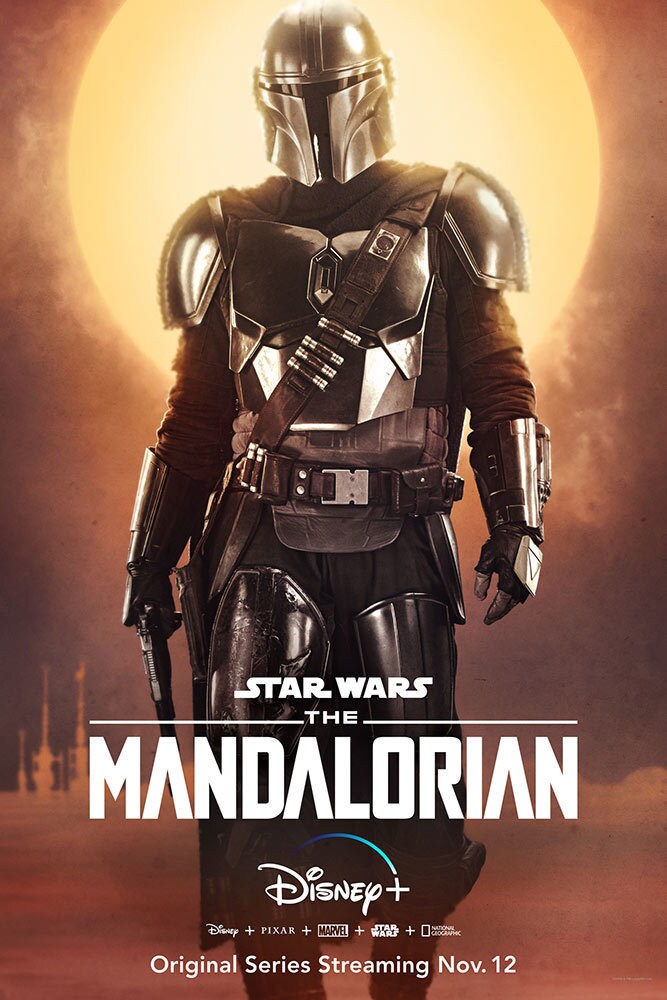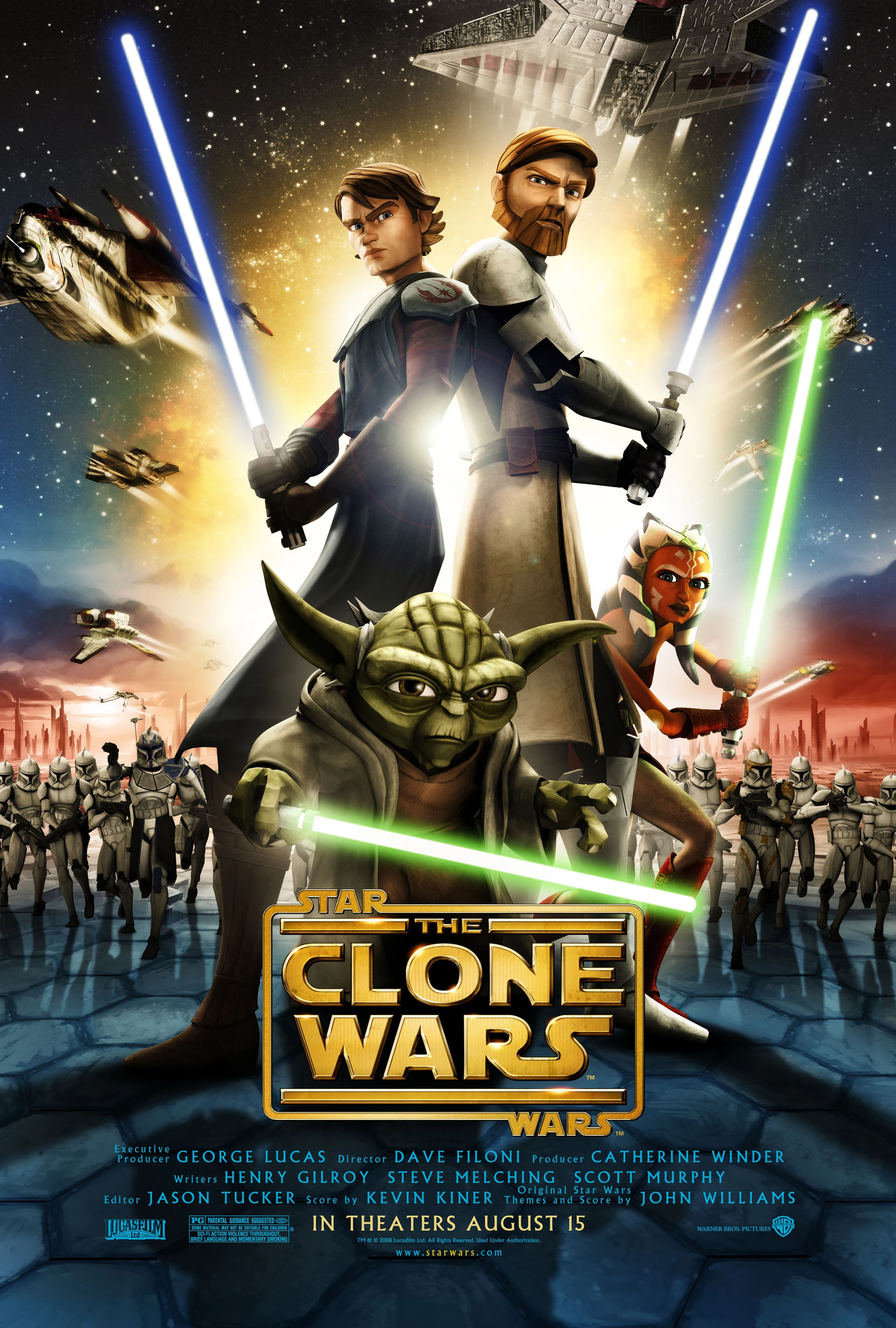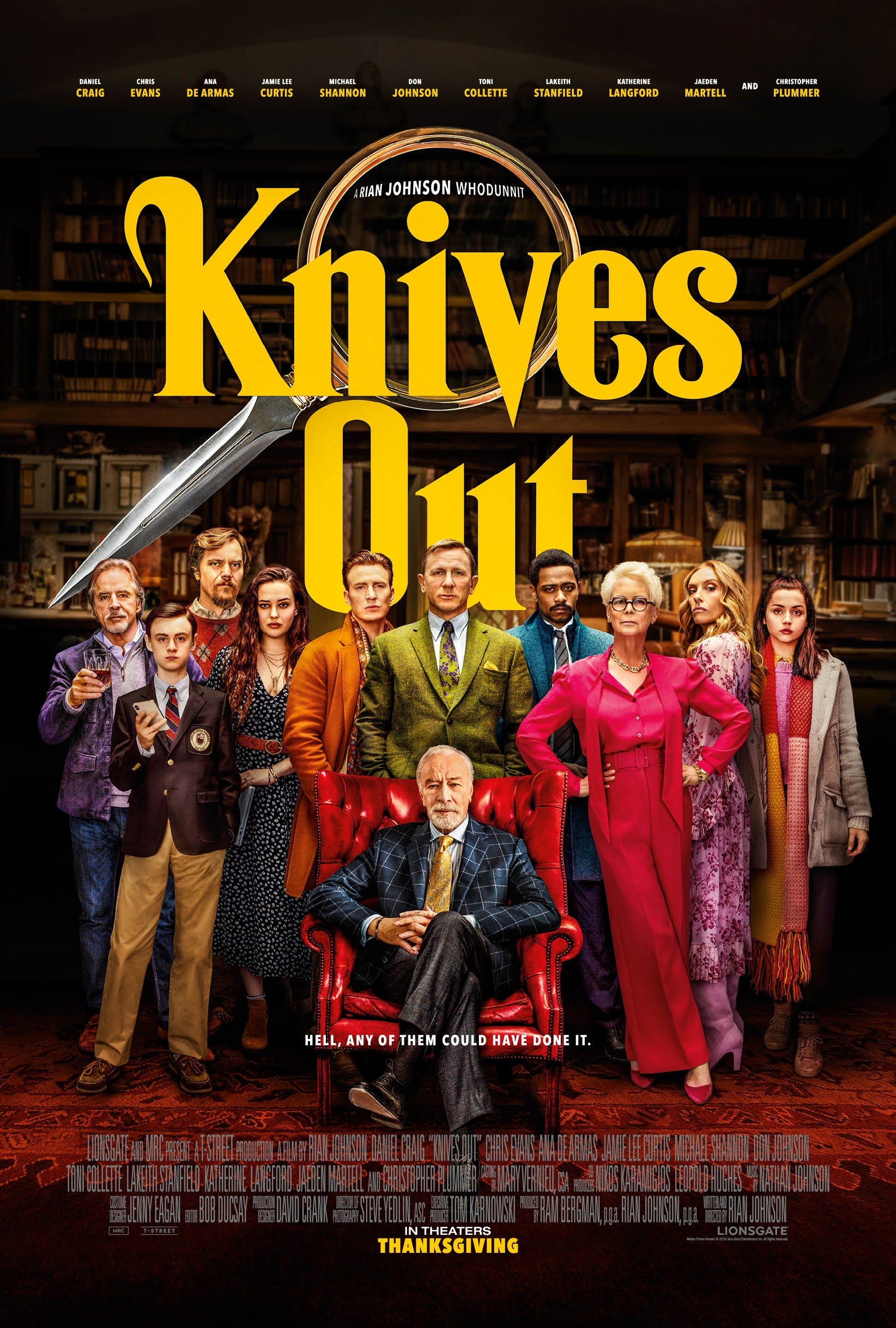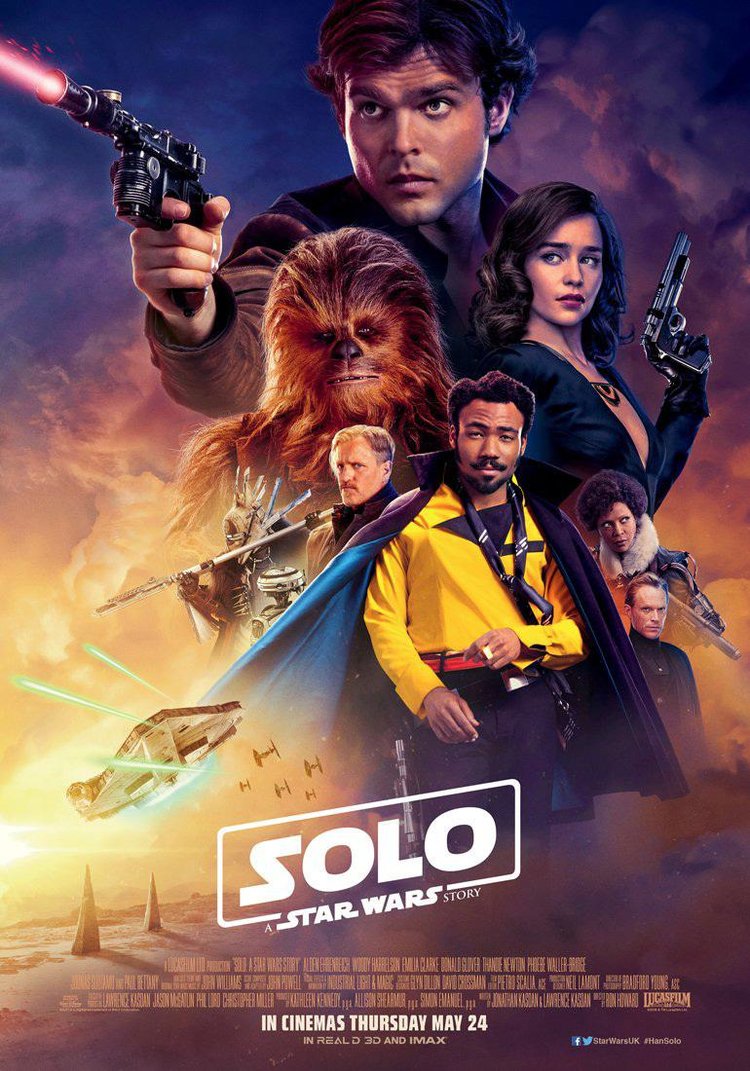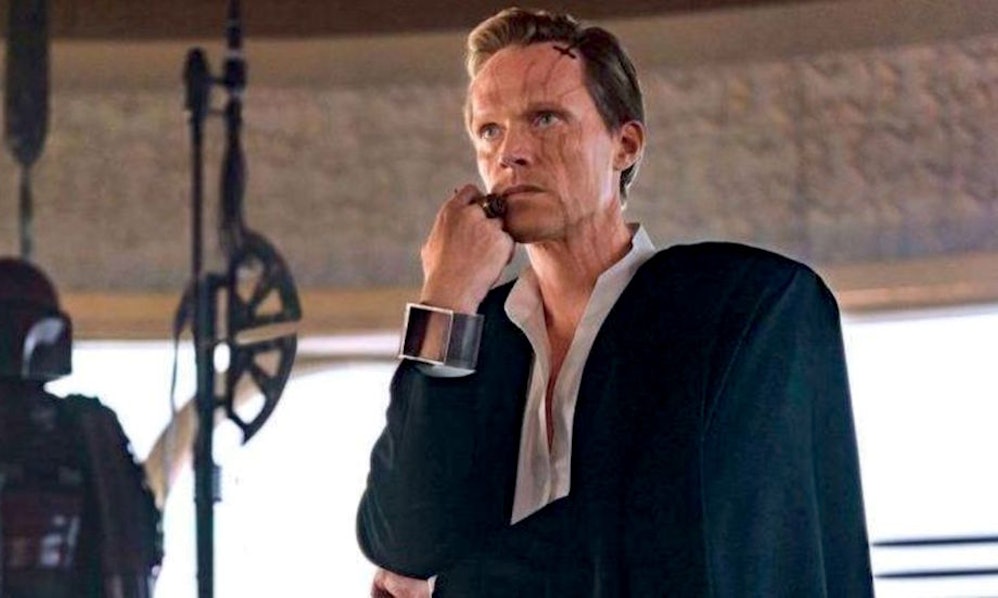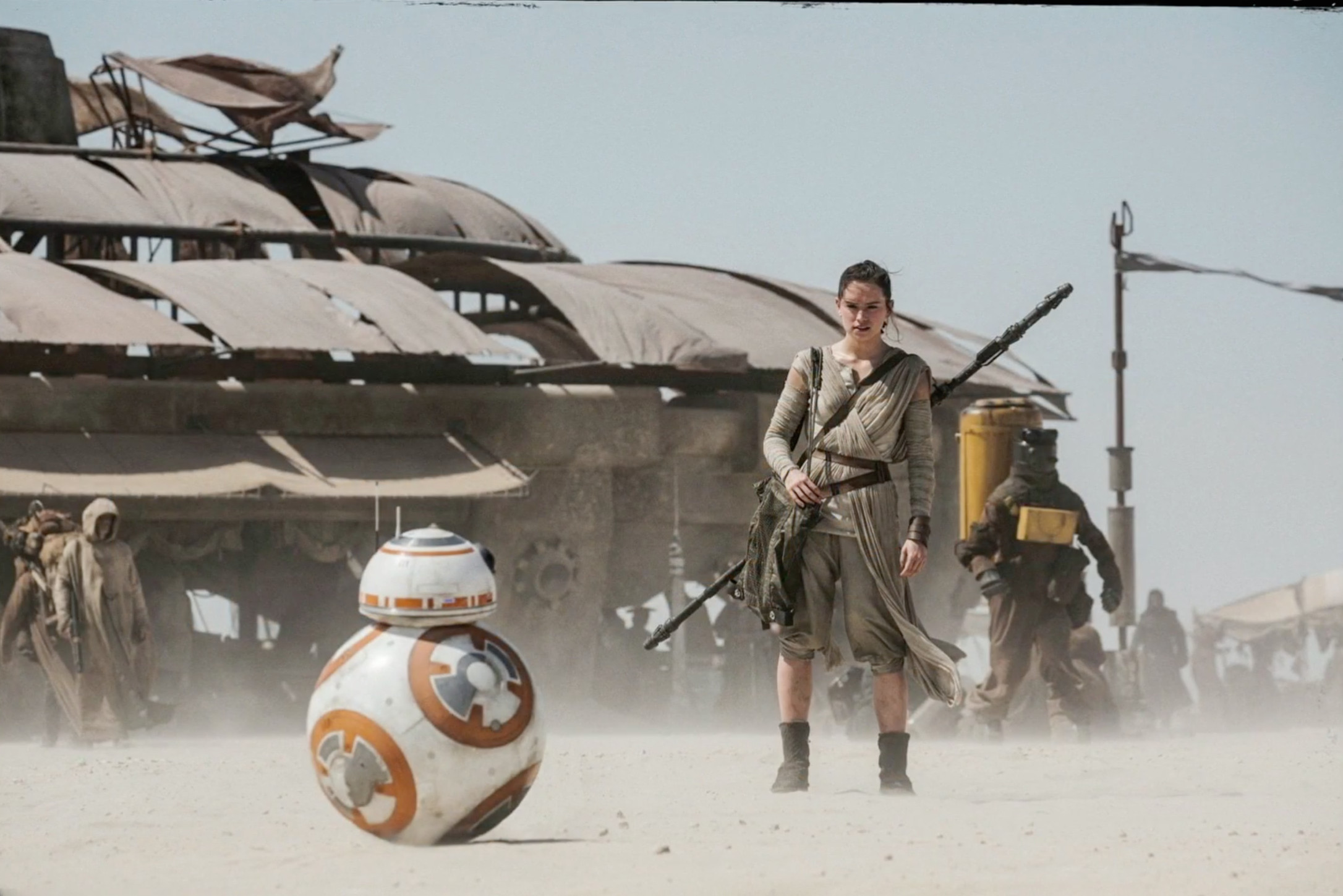The Mandalorian, season 1 (2019)
A highly entertaining show that, while having a few lulls, was a fun realization of oft-untapped potential in the massive Star Wars universe.
Like many, when I heard about The Mandalorian, it was the final nudge I needed to sign up for Disney's new streaming service, Disney+. It paid off, as both my wife and I enjoyed so much of what the show had to offer.
The show, helmed by Jon Favreau, takes place shortly after the events of Return of the Jedi, in which the Empire has been defeated by the Rebels, led by Luke Skywalker and his companions Leia, Han Solo, and others. Now that the Empire has dissolved, a certain amount of lawlessness has increased throughout the galaxy, opening up opportunities for some while making life more difficult for others. Operating in these tight and shadowy places is the titular Mandalorian, a bounty hunter whose name we don't know and is only referred to by the nickname "Mando," a call towards his cultural tribe. In the first episode, Mando takes on a sizeable bounty to acquire a mysterious person and return them to the client, who is apparently a former Imperial official. Once Mando finds the target, though, things grow exponentially more complicated.
The premise and set up of the show are brilliant, in that they offer so much of what any fan would want - fans of both Star Wars or just fun, lively television. The entire first season is a very manageable eight episodes, each ranging between 35 minutes to an hour, with most clocking in towards the shorter end. While the main story is Mando figuring out how to evade various pursuers, stemming from the initial bounty-gone-wrong in the first episode, several episodes in the middle are fairly stand-alone. On the whole, the series is solid, though one or two of those middle episodes are weaker than the others.
The show finished really strong, with plenty of crowd-pleasing moments that didn't devolve into pure Star Wars fan service. Though the show is very clearly set in the Star Wars universe, it tells its own tale, with its own characters, never relying on cameos by better-known characters from the movies. And this first season did a great job of taking any lose narrative threads left from the first two episoed and tying them all back together in the final two. The title role is done well, if not exactly requiring a great range of skills, especially since his head is covered the entire time. All the same, the writing is solid and the over-arcing story is compelling.
The final episode - the best of this first season - set up the already-confirmed follow-up season very nicely. I look forward to it with plenty of anticipation. Looks like creator, writer, and director Jon Favreau has another really solid hit on his hands.
The Clone Wars, seasons 1 through 3 (2008-2011)
A rather impressive TV series aimed at young adult fans of Star Wars that I had never bothered with until recently. It's clearly meant for a younger audience, but it also offers some decent narrative "glue" for some of us (much) older fans.
Being a Gen X person who grew up in the suburbs, I was as into Star Wars as any such kid of that demographic, and that remained the case well after my teen years. Then came the prequels, which were...underwhelming. Since then, I started to see the entire Star Wars behemoth for what it was - a fun, well-conceived and well-executed PG-rated fantasy tale aimed mostly at viewers between the ages of 5 and 15. But there has always remained that kid in me that has fun watching what the series has to offer, without ever going overboard about it. Hence, I never sought out The Clone Wars, which was a series kicked off with a feature film back in 2008 and telling tales between 2002's Attack of the Clones and 2005's Revenge of the Sith. These are the years during which Jedi Master Obi-Wan Kenobi, Knight Anakin Skywalker (still years before he was turned to the dark side), and Skywalker's apprentice Ahsoka Tano serve as peace-keepers during the long military struggle between the Galactic Republic and a faction of separatist systems headed by former Jedi master Count Dooku.
These first three seasons, while uneven, certainly have their moments. And by the third season, I was impressed at the depth a some of the themes, given that it is a show geared towards younger fans. Like many animated series from the 1980s and '90s, the show offers a mix of one-off, stand-alone episodes and some two- and three-episode story arcs. Typically, it is the arcs that are the strongest tales, and these are often where you find the strongest connections to the feature Star Wars films. The primary addition in terms of characters is Ahsoka Tano, a young apprentice under the tutelage of Anakin Skywalker. The dynamic between the two isn't terribly surprising, with Ahsoka being a tenacious, precicious, and headstrong apprentice, very much like Anakin was under the instruction of Obi-Wan Kenobi. It is the episodes which focus on those three - Tano, Skywalker, and Kenobi, which are the most reliably entertaining.
There are certainly other characters who merit attention and pique one's interest. New Jedi Masters like Kit Fisto (the names are hilarious, if you couldn't tell), Plo Koon, and others are fun. And new Sith apprentice Assage Ventress and bounty hunters like Cad Bane are also entertaining additions.
Of course, it's easy to be reminded when watching that this show's target audience is viewers between, say, 12 and 16. Especially through these first three seasons, very few characters are more than one-dimensional. The heroes are almost always heroic, and the villains are especially villainous. However, there are a few moments where the story shows a bit of nuance and depth, as do certain characters at times. The dialogue isn't going to impress anyone with a discerning ear, often locked into cliche and noted lines from the source movies, but it's passable if one accepts it as it is.
Since I started writing this, I've also worked my way through all of Season 4 and have started Season 5, and the improvements are notable. I'll be sharing my thoughts on those seasons soon.
A highly entertaining show that, while having a few lulls, was a fun realization of oft-untapped potential in the massive Star Wars universe.
Like many, when I heard about The Mandalorian, it was the final nudge I needed to sign up for Disney's new streaming service, Disney+. It paid off, as both my wife and I enjoyed so much of what the show had to offer.
The show, helmed by Jon Favreau, takes place shortly after the events of Return of the Jedi, in which the Empire has been defeated by the Rebels, led by Luke Skywalker and his companions Leia, Han Solo, and others. Now that the Empire has dissolved, a certain amount of lawlessness has increased throughout the galaxy, opening up opportunities for some while making life more difficult for others. Operating in these tight and shadowy places is the titular Mandalorian, a bounty hunter whose name we don't know and is only referred to by the nickname "Mando," a call towards his cultural tribe. In the first episode, Mando takes on a sizeable bounty to acquire a mysterious person and return them to the client, who is apparently a former Imperial official. Once Mando finds the target, though, things grow exponentially more complicated.
The premise and set up of the show are brilliant, in that they offer so much of what any fan would want - fans of both Star Wars or just fun, lively television. The entire first season is a very manageable eight episodes, each ranging between 35 minutes to an hour, with most clocking in towards the shorter end. While the main story is Mando figuring out how to evade various pursuers, stemming from the initial bounty-gone-wrong in the first episode, several episodes in the middle are fairly stand-alone. On the whole, the series is solid, though one or two of those middle episodes are weaker than the others.
The show finished really strong, with plenty of crowd-pleasing moments that didn't devolve into pure Star Wars fan service. Though the show is very clearly set in the Star Wars universe, it tells its own tale, with its own characters, never relying on cameos by better-known characters from the movies. And this first season did a great job of taking any lose narrative threads left from the first two episoed and tying them all back together in the final two. The title role is done well, if not exactly requiring a great range of skills, especially since his head is covered the entire time. All the same, the writing is solid and the over-arcing story is compelling.
The final episode - the best of this first season - set up the already-confirmed follow-up season very nicely. I look forward to it with plenty of anticipation. Looks like creator, writer, and director Jon Favreau has another really solid hit on his hands.
The Clone Wars, seasons 1 through 3 (2008-2011)
A rather impressive TV series aimed at young adult fans of Star Wars that I had never bothered with until recently. It's clearly meant for a younger audience, but it also offers some decent narrative "glue" for some of us (much) older fans.
Being a Gen X person who grew up in the suburbs, I was as into Star Wars as any such kid of that demographic, and that remained the case well after my teen years. Then came the prequels, which were...underwhelming. Since then, I started to see the entire Star Wars behemoth for what it was - a fun, well-conceived and well-executed PG-rated fantasy tale aimed mostly at viewers between the ages of 5 and 15. But there has always remained that kid in me that has fun watching what the series has to offer, without ever going overboard about it. Hence, I never sought out The Clone Wars, which was a series kicked off with a feature film back in 2008 and telling tales between 2002's Attack of the Clones and 2005's Revenge of the Sith. These are the years during which Jedi Master Obi-Wan Kenobi, Knight Anakin Skywalker (still years before he was turned to the dark side), and Skywalker's apprentice Ahsoka Tano serve as peace-keepers during the long military struggle between the Galactic Republic and a faction of separatist systems headed by former Jedi master Count Dooku.
These first three seasons, while uneven, certainly have their moments. And by the third season, I was impressed at the depth a some of the themes, given that it is a show geared towards younger fans. Like many animated series from the 1980s and '90s, the show offers a mix of one-off, stand-alone episodes and some two- and three-episode story arcs. Typically, it is the arcs that are the strongest tales, and these are often where you find the strongest connections to the feature Star Wars films. The primary addition in terms of characters is Ahsoka Tano, a young apprentice under the tutelage of Anakin Skywalker. The dynamic between the two isn't terribly surprising, with Ahsoka being a tenacious, precicious, and headstrong apprentice, very much like Anakin was under the instruction of Obi-Wan Kenobi. It is the episodes which focus on those three - Tano, Skywalker, and Kenobi, which are the most reliably entertaining.
There are certainly other characters who merit attention and pique one's interest. New Jedi Masters like Kit Fisto (the names are hilarious, if you couldn't tell), Plo Koon, and others are fun. And new Sith apprentice Assage Ventress and bounty hunters like Cad Bane are also entertaining additions.
Of course, it's easy to be reminded when watching that this show's target audience is viewers between, say, 12 and 16. Especially through these first three seasons, very few characters are more than one-dimensional. The heroes are almost always heroic, and the villains are especially villainous. However, there are a few moments where the story shows a bit of nuance and depth, as do certain characters at times. The dialogue isn't going to impress anyone with a discerning ear, often locked into cliche and noted lines from the source movies, but it's passable if one accepts it as it is.
Since I started writing this, I've also worked my way through all of Season 4 and have started Season 5, and the improvements are notable. I'll be sharing my thoughts on those seasons soon.
